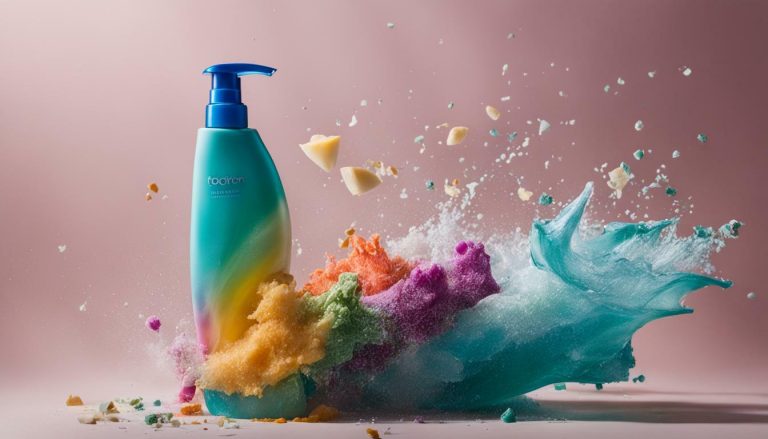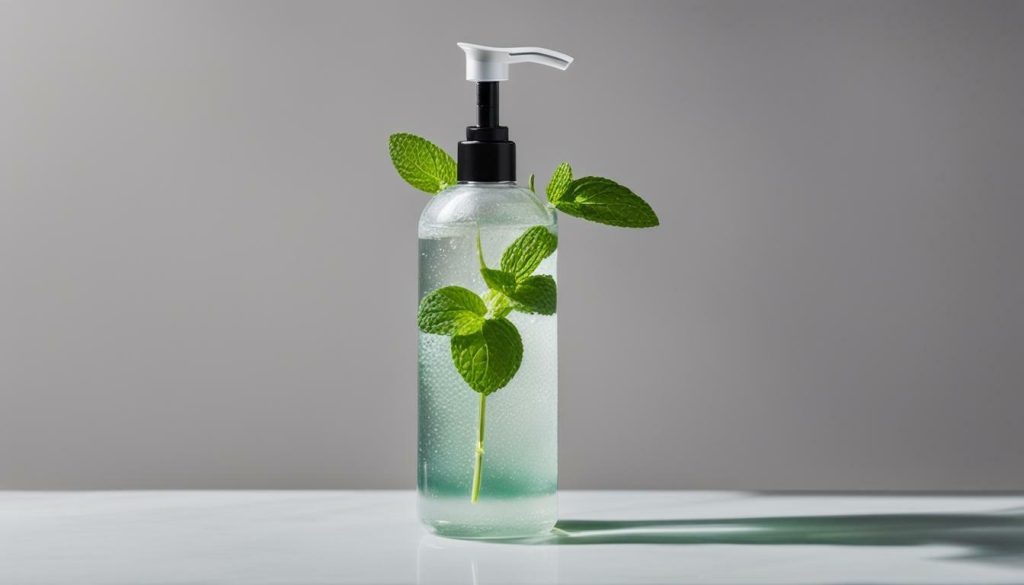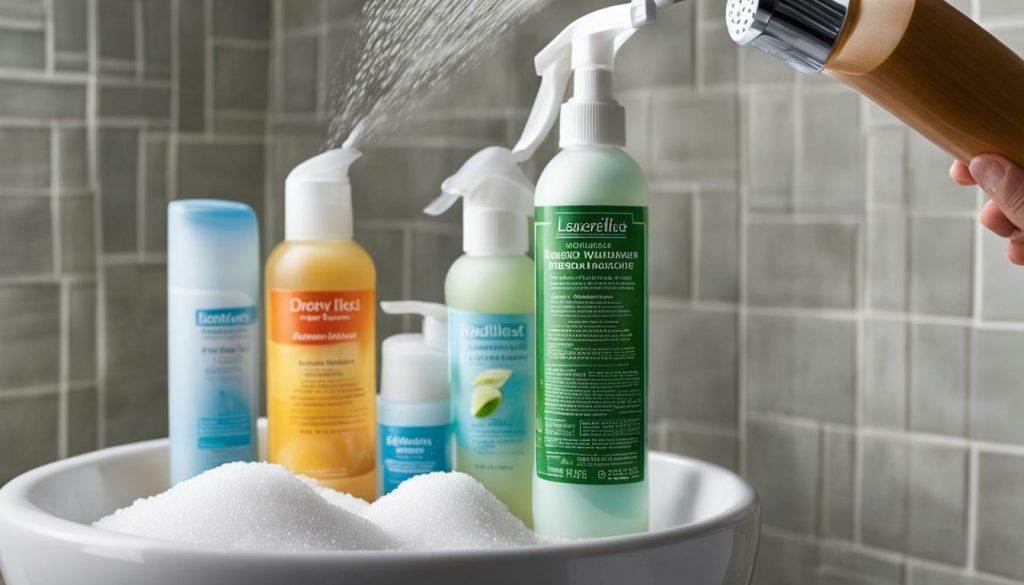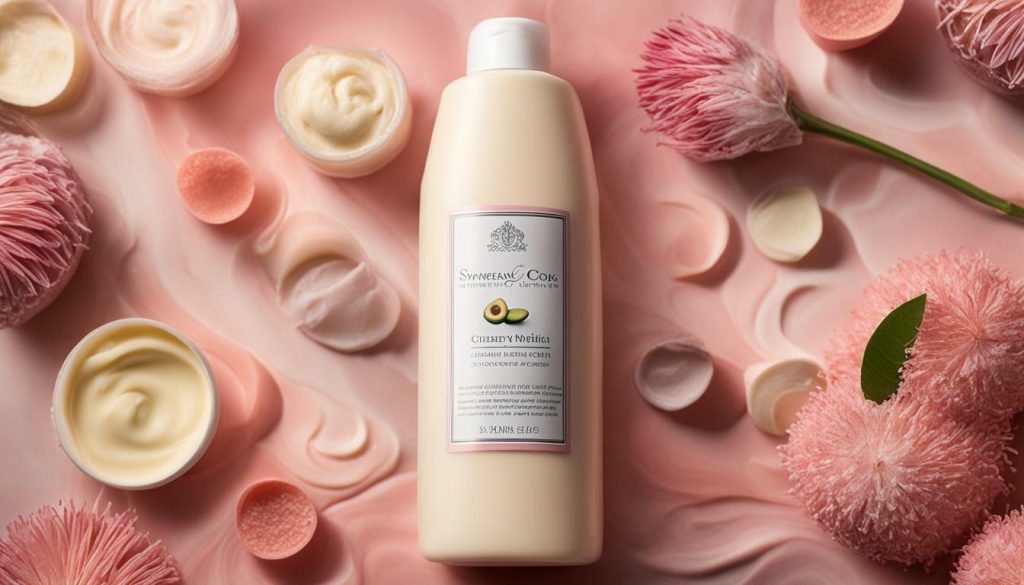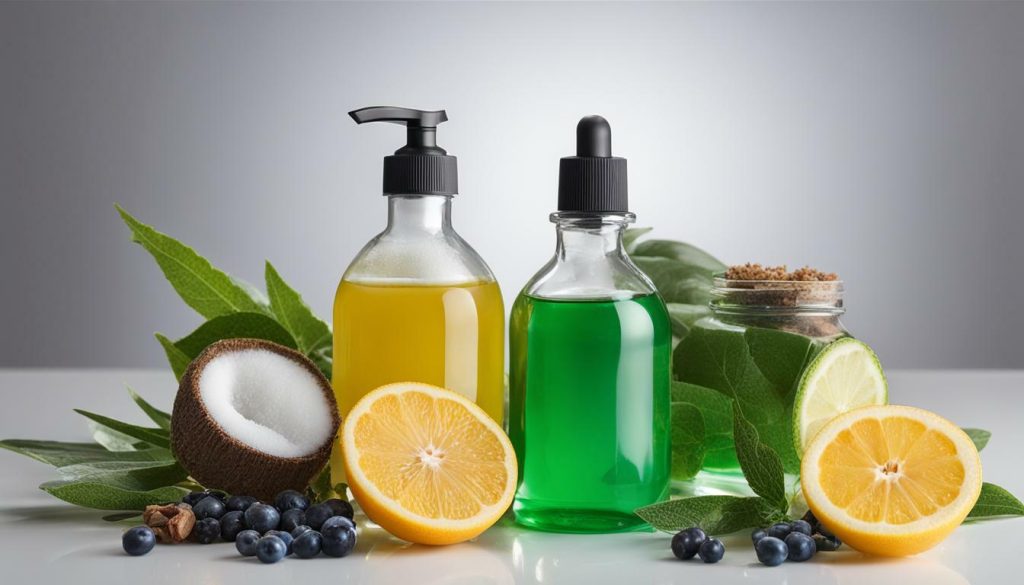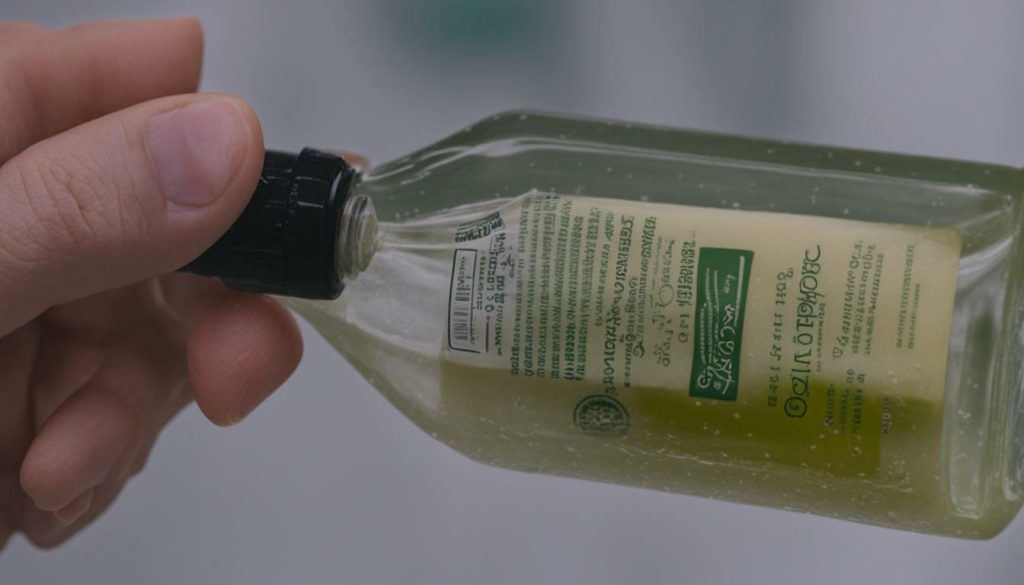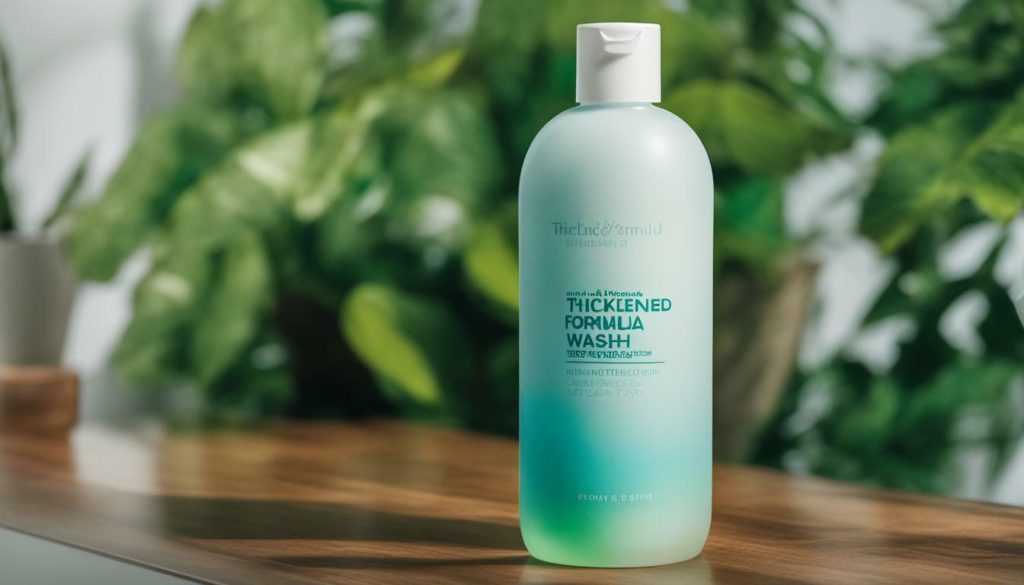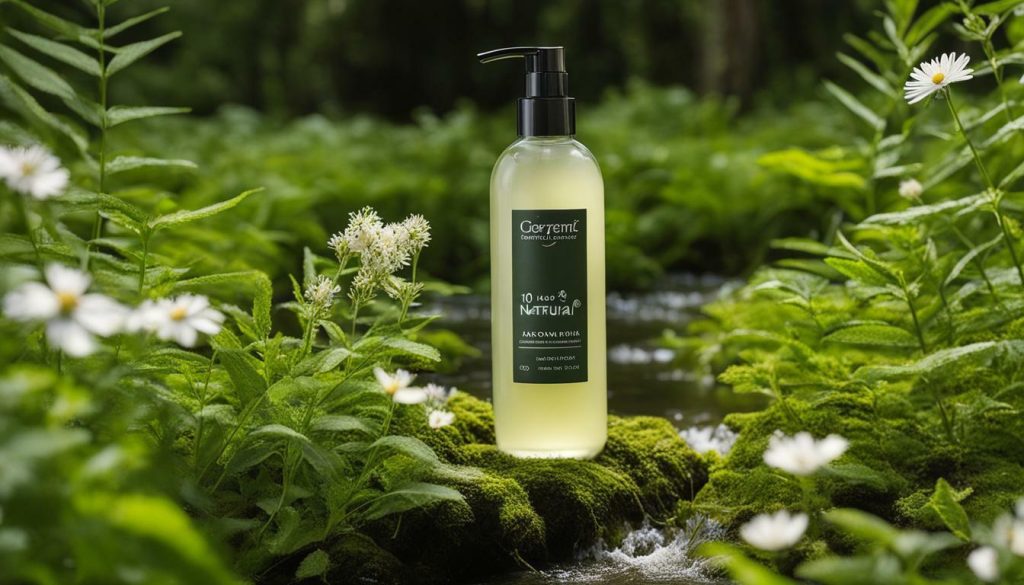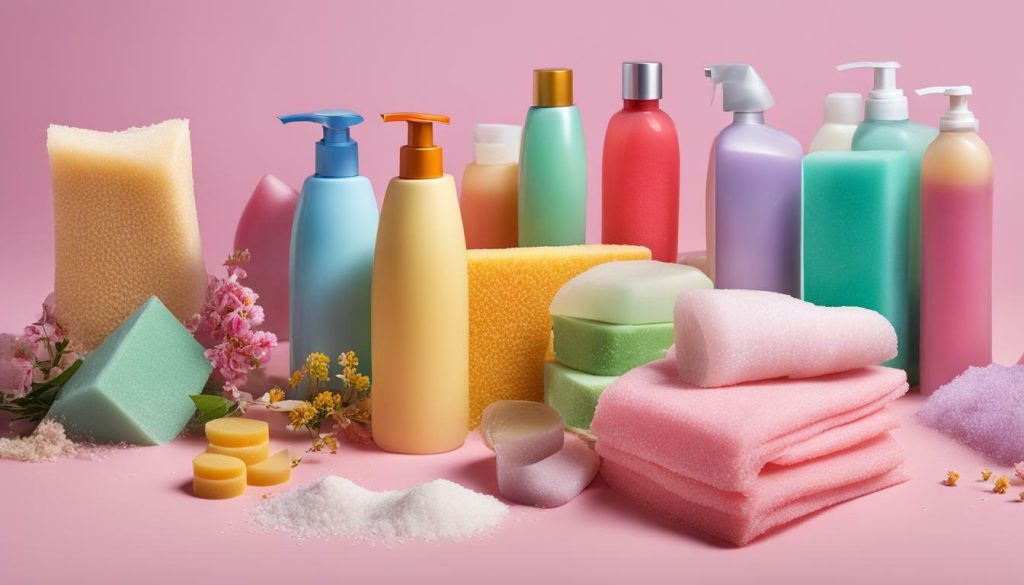If you’re like most people, you probably use body wash every day without giving much thought to what it’s made of. But understanding the ingredients in your body wash can help you make informed decisions about your skincare routine. In this section, we’ll take a closer look at the components that make up body wash, and how they contribute to its cleansing and moisturizing properties.
Body wash is a liquid soap formulated to cleanse and moisturize the skin. It’s made up of a combination of ingredients, including surfactants, emollients, moisturizers, fragrances, essential oils, pH balancing agents, preservatives, thickeners, stabilizers, and specialty additives. Each of these components plays a unique role in the effectiveness of body wash.
Key Takeaways
- Body wash is a liquid soap formulated to cleanse and moisturize the skin.
- Body wash is made up of a combination of ingredients, including surfactants, emollients, moisturizers, fragrances, essential oils, pH balancing agents, preservatives, thickeners, stabilizers, and specialty additives.
- Understanding the ingredients in your body wash can help you make informed decisions about your skincare routine.
The Basics of Body Wash
Body wash is a liquid cleansing product that is used to clean the body during a bath or shower. Unlike traditional soap, body wash is formulated with a combination of different ingredients that provide a more luxurious and moisturizing experience.
Body wash comes in many different varieties, each with its own unique scent and formulation. Some contain exfoliants, while others are designed specifically for sensitive skin. No matter the type you choose, body wash can leave your skin feeling clean, smooth, and hydrated.
Surfactants in Body Wash
When you lather up with your favorite body wash, you can thank surfactants for that cleansing, bubbly goodness. Surfactants are the active ingredients in body wash that dissolve dirt and oil on your skin and help suspend it in the water to be washed away.
There are several types of surfactants used in body wash, including anionic, cationic, nonionic, and amphoteric surfactants. Anionic surfactants, such as sodium lauryl sulfate, are commonly used in body wash because of their ability to create a rich lather. Cationic surfactants, on the other hand, are typically used in conditioning body washes to provide a soft, smooth feel to the skin.
Nonionic surfactants, like decyl glucoside, are known for their mildness and are often used in natural and organic body washes. Amphoteric surfactants, such as cocamidopropyl betaine, are used to balance the pH level of the body wash and reduce irritation.
While surfactants are necessary for effective cleansing, some people with sensitive skin may experience irritation or dryness from certain surfactants. Look for body washes formulated with milder surfactants if you have sensitive skin.
The Science Behind Surfactants
Surfactants work by lowering the surface tension between water and oil, allowing the two substances to mix. This allows dirt and oil to be easily washed away without leaving a residue on the skin.
In addition, surfactants can help increase the solubility of other ingredients in the body wash, such as fragrances and emollients, improving their effectiveness.
Overall, surfactants are a crucial ingredient in body wash that play an important role in effective cleansing and improving the sensory experience of the product. Be sure to choose a body wash formulated with surfactants that work well with your skin type for the best results.
Emollients and Moisturizers
When it comes to body wash, one of the most important ingredients you should look for is emollients and moisturizers. These ingredients play a crucial role in keeping your skin hydrated, soft, and smooth. Emollients work by forming a protective layer on the surface of your skin to lock in moisture, while moisturizers penetrate deeper into your skin to hydrate and nourish it from within.
Common emollients used in body wash formulations include petrolatum, mineral oil, and various plant oils such as jojoba, coconut, and olive oil. These ingredients help to improve the texture of your skin and keep it looking healthy.
The Role of Moisturizers
Moisturizers, on the other hand, are designed to hydrate and nourish your skin. They can be divided into two categories: humectants and occlusives. Humectants work by attracting water molecules to the surface of your skin, while occlusives form a barrier on your skin to prevent moisture loss.
Some common moisturizing ingredients used in body wash include glycerin, urea, and hyaluronic acid. These ingredients are known for their ability to hydrate and nourish your skin, leaving it feeling soft and supple.
Overall, emollients and moisturizers are essential ingredients to look for in any body wash product. They provide your skin with the hydration and nourishment it needs to stay healthy and glowing.
Fragrances and Essential Oils
The sensory experience of using body wash is enhanced by the addition of fragrances and essential oils. These ingredients give body wash its signature scents, which can range from invigorating citrus to delicate floral notes.
Fragrances are typically synthetic, but essential oils are extracted from plants and offer natural aromas. These scents can have a therapeutic effect on your mood and emotions, making your shower or bath a relaxing and rejuvenating experience.
Essential oils can also have additional benefits for your skin. For example, tea tree oil is known for its antibacterial properties, while lavender oil has a calming effect on the skin.
When choosing a body wash with fragrances or essential oils, it’s important to consider any allergies or sensitivities you may have. Some fragrances and essential oils can cause reactions for those with sensitive skin, so be sure to read the label carefully and patch-test the product before use.
Overall, fragrances and essential oils are a key component of body wash, providing sensory enjoyment and potential skincare benefits.
Surfactants in Body Wash
Surfactants are the workhorses of body wash formulations. They are responsible for creating the lather that cleanses and removes impurities from your skin. Without surfactants, body wash would not be effective.
There are two main types of surfactants used in body wash:
Anionic surfactants: These are the most commonly used surfactants. Anionic surfactants have a negative charge and are excellent at removing dirt, oil, and other impurities from the skin. However, they can be harsh and strip the skin of its natural oils if used excessively or if the body wash formulation is too strong.
Non-ionic surfactants: These surfactants have no charge and are gentler than anionic surfactants. They are often used in combination with anionic surfactants to provide a milder cleansing experience.
pH Balancing Agents
It’s important for body wash formulations to have a balanced pH level, as our skin’s natural pH is slightly acidic. If the pH level of body wash is too alkaline, it can disrupt our skin’s protective barrier, leading to dryness and irritation.
To maintain the right pH level, pH balancing agents are added to body wash formulations. These agents work by neutralizing the alkaline properties of anionic surfactants. Common pH balancing agents include citric acid, lactic acid, and glycolic acid.
It’s worth noting that some people may prefer a slightly acidic body wash, as it can help reduce the growth of acne-causing bacteria and maintain a healthy skin microbiome. However, if you have sensitive skin, it’s best to stick to a body wash with a neutral pH.
Preservatives in Body Wash
Preservatives in body wash are essential to prevent bacterial and fungal growth, ensuring the safety and longevity of the product. Preservatives are particularly important in water-based formulations, such as body wash, because they provide a moist environment that can harbor unwanted microorganisms. Without preservatives, body wash may become contaminated and unsafe for use.
Commonly used preservatives in body wash include parabens, formaldehyde releasers, and methylisothiazolinone. While these have been effective preservatives in the past, there has been a growing concern about their safety and potential health risks. As a result, many companies are now turning to alternative preservatives or opting for preservative-free formulations.
It is important to note that some individuals may have allergies or sensitivities to certain preservatives. If you have experienced skin irritation or allergic reactions in the past, be sure to check the ingredient list of your body wash for potential allergens or sensitizers. If you are unsure, it is always best to consult with a dermatologist or allergist before trying a new product.
Thickeners and Stabilizers
Thickeners and stabilizers are the unsung heroes of body wash formulations. Without them, body wash would be too thin or too thick, not lather properly, and lose its consistency over time.
One of the most common thickeners used in body wash is sodium chloride, or table salt. It not only thickens the product but also enhances its texture and helps to exfoliate the skin. Another popular thickener is xanthan gum, a natural ingredient derived from fermented corn sugar. It helps to create a smooth, gel-like texture and improve the overall feel of the product on the skin.
Stabilizers, on the other hand, help to preserve the quality and consistency of body wash. One common stabilizer is guar gum, which helps to prevent the product from separating over time and ensures that the texture remains consistent.
Overall, thickeners and stabilizers are essential to creating a high-quality body wash that provides a pleasant and consistent experience for the user.
Additives and Specialty Ingredients
Body wash formulations may also contain a range of additives and specialty ingredients that provide additional benefits for the skin. These can include:
Exfoliants
Exfoliating ingredients such as microbeads or natural exfoliants like sugar or salt granules can help remove dead skin cells and improve skin texture. However, some exfoliants can be too harsh for certain skin types, so it’s important to choose a body wash with exfoliants that suit your skin’s needs.
Vitamins
Body washes may contain vitamins such as vitamin E, C, or B5 to nourish and protect the skin, promote collagen production, and prevent damage from free radicals.
Botanical Extracts
Natural plant extracts such as aloe vera, chamomile, or lavender can soothe, moisturize, and calm the skin. They may also have anti-inflammatory or antibacterial properties and provide a pleasant aroma.
Body washes may also contain other specialty ingredients such as shea butter, glycerin, or green tea extract to hydrate, protect, or rejuvenate the skin. However, it’s important to note that not all specialty ingredients are suitable for every skin type, so it’s best to check the label or consult with a dermatologist if you have any concerns.
When choosing a body wash, it’s important to consider the additives and specialty ingredients as they can have a significant impact on the efficacy of the product and your overall skin health. By understanding the role of these ingredients and what they offer, you can make an informed decision and choose a body wash that best suits your skin’s needs.
Natural and Organic Body Washes
If you are looking for a body wash that is gentle on your skin and the environment, you may want to consider natural and organic options. These products typically contain plant-based ingredients, free of harsh chemicals, and are produced sustainably.
Natural body washes use ingredients that occur in nature and are minimally processed, such as botanical extracts and essential oils. These products are often free from synthetic fragrances, dyes, and preservatives, which can be irritating to sensitive skin.
Organic body washes take natural products one step further by using ingredients that have been grown without the use of pesticides, herbicides, or genetically modified organisms (GMOs). This means that the ingredients are not only better for your skin but also for the environment.
Some common natural and organic body wash ingredients include aloe vera, chamomile, lavender, and tea tree oil. These ingredients offer a range of benefits, from calming irritated skin to reducing inflammation and promoting cell regeneration.
It is important to note that not all natural or organic products are created equal, and some may still contain potential allergens or sensitizers. Always read the label carefully and do your research to ensure that the product meets your standards and needs.
If you are concerned about the impact of your skincare products on the environment, natural and organic body washes can be a great choice. These products are often packaged in recyclable or biodegradable materials and are produced using sustainable practices. By choosing natural and organic body washes, you are not only taking care of your skin but also contributing to a healthier planet.
Common Allergens and Sensitizers in Body Wash
When it comes to body wash, certain ingredients can cause allergic reactions or sensitivities for some people. It’s important to be aware of these potential irritants in order to avoid them and prevent any adverse reactions. Here are some of the most common allergens and sensitizers found in body wash:
Fragrances
Fragrances are added to body wash to enhance the scent and sensory experience. However, they are also one of the most common allergens found in personal care products. If you have sensitive skin, look for fragrance-free body wash to avoid any potential reactions.
Preservatives are necessary in body wash to prevent bacterial growth and extend the product’s shelf life. However, some preservatives such as formaldehyde and parabens can cause skin irritation and allergic reactions in some people. Look for preservative-free or naturally preserved body wash options if you are concerned about these ingredients.
Surfactants
Surfactants are the cleansing agents in body wash that help to remove dirt and oil from the skin. However, some surfactants such as sodium lauryl sulfate (SLS) can cause skin irritation and dryness, especially for those with sensitive skin. Look for body washes with gentler surfactants like sodium laureth sulfate (SLES) if you are prone to irritation.
Essential Oils
Essential oils are often added to body wash for their natural fragrance and therapeutic properties. However, some essential oils like tea tree oil and lavender oil can cause allergic reactions or sensitivities in some individuals. If you have sensitive skin, be cautious when using body washes with essential oils and patch test first.
By being aware of these common allergens and sensitizers in body wash, you can make informed choices and avoid any potential reactions. Always read the ingredient label before purchasing and patch test new products if you have sensitive skin. Your skin will thank you for it!
Conclusion
In conclusion, understanding the ingredients in your body wash is crucial for making informed skincare choices. By knowing what each ingredient does, you can select a body wash that caters to your specific needs, whether it’s hydration, nourishment, or fragrance. It is also important to be aware of potential allergens and sensitizers and how to avoid them if you have sensitive skin.
As we have learned, body wash is made up of various components, including surfactants, emollients, fragrances, pH balancing agents, preservatives, thickeners, stabilizers, and additives. In addition, there is a growing trend towards natural and organic body washes, which offer unique advantages for those who prefer to use products with fewer synthetic ingredients.
Remember, the ingredients in your body wash can have a significant impact on the health and appearance of your skin. So, take the time to read the labels and choose a product that aligns with your skincare goals. With this knowledge, you can confidently incorporate body wash into your daily routine, knowing that you are taking the best possible care of your skin.

Hey there! I’m Dr. Mary Noland, your trusted authority in dermatology. My 17-year rollercoaster ride in skin science has been nothing short of a masterclass. Whether you’re a newbie or a familiar face, I’m here with open arms and Medicare-friendly services, dedicated to creating your perfect skin haven.
But hold up! There’s more to me. When I’m not elbow-deep in dermatology, I’m lighting up derma blogs with insights that peel back the layers of skin health. Also, as the proud captain of ‘buybodywash.com‘, I provide all the body care goodness you need!
Trust me; I’m more than just a white coat. I’m here to lend an ear, share a laugh, and bring calm with a reassuring voice that’s comforted countless patients.
So, meet Dr. Mary Noland – your dermatologist and your guide and friend on the path to radiant skin. I am excited to meet you soon!

